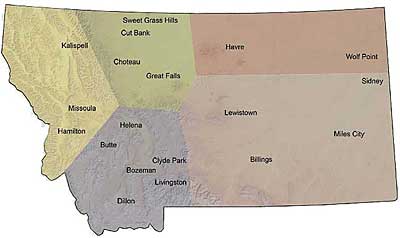
Montana cities map by MontanaPBS
MontanaPBS adds full-power transmitters in bigger cities
Montana’s public TV network expanded its service in the state’s most populous city last month and will soon bring the first over-the-air PBS service to the third-largest market.
MontanaPBS’s new over-the-air DTV station signed on June 12 in Billings, the state’s biggest city with about 100,000 people. Billings residents previously received MontanaPBS only on cable and a low-power transmitter, which is still operating.
Meanwhile, the broadcaster has begun its final push to raise $1.2 million for a new station in the No. 3 city, Great Falls, where it already holds an approved construction permit.
“These are two very large communities,” says Eric Hyyppa, g.m. of KUSM in Bozeman. “We’re thrilled to be moving into them and providing free public broadcasting for the first time.”
Based at Montana State Unversity, Hyyppa’s station is one of two staffed facilities that make up MontanaPBS. The other, Missoula’s KUFM, is licensed to the University of Montana.
MontanaPBS is carried on cable systems around the state, Hyyppa says, but cable isn’t available to many viewers in rural areas and on the outskirts of cities. More Montana residents than the national average get their television over the air or via satellite services, he says.
The new Billings station, KBGS, signed on to coincide with the shutoff date for analog TV. It carries MontanaPBS’s primary service and three additional multicast channels: an all-kids’ stream programmed by MontanaPBS; American Public Television’s Create; and TV Montana, a channel that televises proceedings at the state capitol. The latter is produced by a Helena nonprofit independent of MontanaPBS.
Hyyppa expects that KBGS will reach more viewers than the low-power translator, but was not sure how many more. The increase may be limited by the terrain of Billings and its surroundings, he says. MontanaPBS has no immediate plans to shut off the translator. The FCC allows it and other translators to continue analog broadcasting.Unlike Billings, Great Falls lacks even a public TV translator. When the full-power station signs on there—which Hyyppa hopes will be this year — it will bring first-time over-the-air service to 85,000 people.MontanaPBS got most of the funding for the Great Falls station from CPB and the Public Telecommunications Facilities Program, which together contributed upwards of $900,000. CPB’s support came out of its Digital Distribution Fund. The station and its counterpart in Billings will each boost MontanaPBS’s base CPB Community Service Grant by 5 percent.
Both communities have given MontanaPBS a warm welcome, Hyyppa says. The school system in Great Falls even enlisted children to stage penny drives and bake sales to support the new station, an effort which raised more than $8,000. A local teachers’ credit union matched the amount.
“Of all the money that’s been raised for that project, I think that was the most rewarding,” Hyyppa says.
Web page posted July 7, 2009
Copyright 2009 by Current LLC